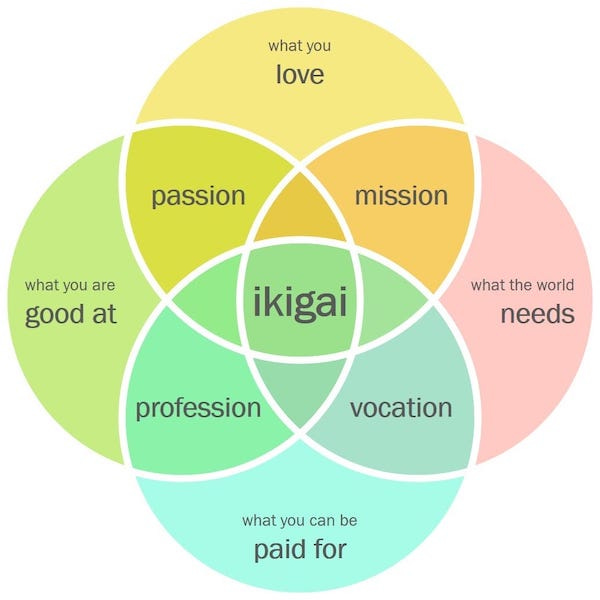What’s your ikigai?
A fascinating Japanese concept can be both very useful and very detrimental

Dear reader,
This post marks my first anniversary at Substack! Just about a year ago I published my opening newsletter, entitled “Figs in winter and the idea of an art of living.”
To celebrate this milestone (127 posts and counting!), I am making the current essay, which would have been behind a paywall according to my regular schedule, freely available to all.
If you enjoy it, please consider upgrading your free subscription and support my writing about Greco-Roman philosophy, better reasoning, and good science.
Philosophia longa, vita brevis!
Sincerely,
Massimo
What are your reasons for living? What gets you going in the morning? What is your purpose in life? These are tough questions about which philosophers, novelists, and now increasingly scientists have been working for literally millennia.
There is a single Japanese word that encapsulates all such questions: ikigai. According to the Oxford English Dictionary ikigai is “a motivating force; something or someone that gives a person a sense of purpose or a reason for living.”
So a very good, and deceptively simple question is: what’s your ikigai? Though to be precise I should ask what are the components of your ikigai, since the idea is that there may be, and in fact very likely are, multiple things that gets you out of bed on Monday mornings (other than the fact that you have to, or else).
The history of ikigai is, like many things in Japan, long, complex, and fascinating. It apparently dates back at least to the 14th century, when it was used to remind people of their social roles within what was then a rigidly hierarchical society.
In modern times the term was popularized by Natsume Soseki in his novel Kokoro, published in 1912.* The title means “the heart of things” and the book, aptly, is about a student’s journey of self-exploration, aided by an older mentor. As Lily Crossley-Baxter points out in her article on ikigai, “published in the final year of the Meiji era, as Japan emerged from isolationism and embraced the international, industrial world, Kokoro piqued the interest of a nation embracing a new way of life” (that same era also saw the definitive sunset of the samurai class). The notion of ikigai was then further updated by psychiatrist Mieko Kamiya in a book published in 1966 and entitled Ikigai Ni Tsuite, i.e., “On the Meaning of Life.”

Psychologist Katsuya Inoue provides us with an illuminating classification of three types of ikigai: social, non-social, and anti-social. To the first category belong things like being a member of a social circle, or volunteering for a charitable organization. Non-social ikigai has to do with practicing self-discipline, say, or focusing on one’s religious faith. Anti-social ikigai is rather disturbing, as it manifests itself through dark emotions, including a desire for revenge or the cultivation of hate.
Indeed, even social ikigai can have what may be considered unhealthy or downright destructive behaviors. In her article, Lily Crossley-Baxter describes the toxic culture of overwork in modern Japan, where some people identify their ikigai with the company they are employed by, and consequently spend 14-hour days at work. Modern Japan also features octogenarians driving taxis instead of enjoying their retirement, “rush” hours lasting well into the night, and most stores being open 24 hours a day seven days a week in the name of customer satisfaction and corporate profit. In other words, the same kind of nightmarish, workaholic society that also characterizes the United States of America.
Inoue, the psychologist, says that ikigai has to do with the things or activities that bring value and meaning to one’s life as well as with the subjective feeling that one’s life has, in fact, value and meaning. The problem is that such sources of meaning range from the prosocial (e.g., volunteering for a charitable organization) to the alienating (identifying one’s life with a company one works for) to the decidedly anti-social (e.g., cultivating hatred).
That’s because ikigai appears to be a value-neutral, or descriptive, concept. Ikigai is not a philosophy of life, but rather a term encapsulating the idea that one can find reasons to continue living, regardless of what said reasons may turn out to be.
Compare that to the obvious parallel with the Greco-Roman tradition: eudaimonia, meaning a life worth living. This is very much a prescriptive concept, because the various philosophical schools that adopted it proposed that there are specific ways to be eudaimon and a number of other ways of existing that are false and bound to undermine one’s eudaimonia.
Take the example of the Stoics, for one. A eudaimonic existence for a Stoic consists in the pursuit of virtue, a term that—in this context—means human excellence. And what makes a human being excellent? Acting prosocially and reasonably. Why? Because Nature itself has made us into highly social creatures capable of rationality. To act accordingly is to act in agreement with Nature, which is the human telos, ultimate goal, purpose. We achieve eudaimonia if we live with purpose, but not just any purpose, only the purpose(s) for which Nature made us.
This is why Marcus Aurelius could answer the question of “why get up in the morning?” in the following way:
“At dawn, when you’re reluctant to get up, have this thought readily available: I have work to do as a human being, and that’s why I’m getting up. Do I still resent it if I’m on my way to do the work for which I was born and for the sake of which I was brought into the world? Or is this what I was made for, to lie in bed and keep myself warm? ‘But it’s really nice.’ So is pleasure what you were born for? And, in general, was it for feeling, not for doing? Can’t you see plants, sparrows, ants, spiders, and bees all doing their own work and playing their part in the world’s order? And are you then reluctant to do human work?” (Meditations, V.1)
Notice Marcus’s reference to what other living organisms do. Every single one of them has a telos, and they are excellent, that is virtuous, to the extent that they work toward that telos. There is a meaning to life, and it is dictated by Nature.
One way to compare ikigai and eudaimonia, then, is that the first is a way to remind ourselves to ask existential questions and the latter is a way to provide answers. Such answers will vary depending on whether you are a Stoic (prosociality and rationality), an Epicurean (pleasure and lack of pain), an Aristotelian (virtue and flourishing), a Pyrrhonist (mental tranquillity), or what not. But none of the available answers from the Greco-Roman tradition involves working 14 hours a day for a corporation, or hating someone.
The value of ikigai, I think, is that it reminds us that there are things that make us get up in the morning, that make our life valuable and purposeful. But that’s only half of the equation. The other half consists in a critical self-analysis to figure out whether some of the possible sources of ikigai ought to be rejected and other cultivated. In so doing we move from the descriptive to the prescriptive, from posing the question to begin to articulate possible answers.
So, what are the components of your ikigai, and why?
_____
* Note: one reader, Satoru Inoue, questions this attribution, writing: “This claim, which looks like it's from Crossley-Baxter's article, is a bit puzzling, because Kokoro does not seem to contain the word "ikigai" as far as I can tell. His previous novel Kōjin (The Wayfarer) does use the word multiple times.”



Nice post, Mssimo!
I hadn't heard of the term ikigai until this blogpost exc a day earlier, in Netflix's series on longevity (Blue zones"). According to its narrator, inhabitants of the five blue zones, live so long because they eat well, move a lot, have lots of friends and have a purpose in life - you see images of Okinawans taking care of their garden and helping eachother, Sardinian 90 year-olds taking their sheep to the mountains, Nicoyan centenarians riding horses - many of these people working for a living or for charity almost every day of their lives. Basically Marcus Aurelius' reason to stand up every day.
(Those blue zones of high longevity are: Okinawa in Japan, Icaria, a Greek island in the east of the Aegean, the highlands of Sardinia, Italy, Nicoya, a Costa Rican peninsula in the Pacific and a 7th day Adventists community around Loma Linda (San Bernadino CA)
Thanks for the nice and informative text. I have two doubts on which I would like to know your opinion:
1. Could it be possible that one's 𝘪𝘬𝘪𝘨𝘢𝘪 was the possibility of dedicating one's days to promoting eudaimonia, understood as the possibility of achieving pro-sociality, rationality, pleasure, the absence of pain, virtue, flourishing and peace of mind (as long as these things were not in competition)? I.e., is it fair to consider 𝘦𝘤𝘭𝘦𝘤𝘵𝘪𝘤𝘪𝘴𝘮 the idea of following different Antique approaches to find eudaimonia instead of considering it something in total accordance to our nature?
2. Regarding the meaning of life found in the idea of 𝘭𝘪𝘷𝘪𝘯𝘨 𝘪𝘯 𝘢𝘤𝘤𝘰𝘳𝘥𝘢𝘯𝘤𝘦 𝘸𝘪𝘵𝘩 𝘯𝘢𝘵𝘶𝘳𝘦, do you think that the 𝘵𝘦𝘭𝘰𝘴 is an ultimate guideline of how nature works or perhaps to generate the idea or desire of satisfying some 𝘵𝘦𝘭𝘰𝘴 could there be other natural principles (such as basic chemical reactions involved in our homeostasis) that generate them and that make us experience them as imminent desires accompanied by the conscious or unconscious intention of satisfying them plus the idea that this works according to a 𝘵𝘦𝘭𝘰𝘴 (even though it is not the case)?
Hope my English is clear. :)